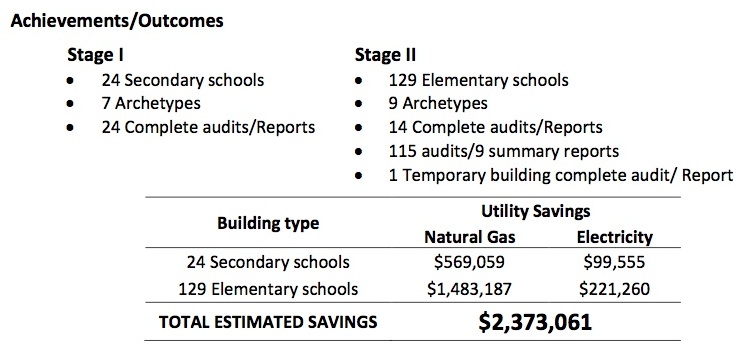
News
McMaster University completes energy audit of Hamilton schools, could save schools $2.4M annually
April 8, 2011
The engineering faculty and students at McMaster University, Ont., have completed a two-year energy audit of local schools that identifies the energy conservation measures which they say could reduce their energy costs by almost $2.4 million annually.
April 8, 2011 By Staff
The measures, presented in March to officials from the Hamilton-Wentworth District School Board and the Hamilton-Wentworth Catholic District School Board, range from recaulking windows, adding insulation and using more efficient lighting to new investments in advanced heat recovery systems and boilers, and solar and wind generating systems.
“We found that the school boards are already involved in implementing many of the more achievable energy conservation measures at their schools,” said Samir Chidiac, professor of civil engineering at McMaster and one of the lead organizers of the audit. “But they need support and decision tools to install technologies that will generate the greatest savings over the long term.”
The energy audit, which was sponsored by Union Gas, was conducted by seven mechanical and civil engineering students working on co-op terms, supervised by two McMaster research engineers.
“Through the Union Gas EnerSmart program, we help our business customers make smart investments in energy-efficient equipment and technologies,” said Mel Ydreos, vice-president of marketing and customer care at Union Gas. “The McMaster students and their advisors have clearly demonstrated investment opportunities for Hamilton schools to significantly reduce energy costs while also reducing their environmental footprint.”
A screening methodology, referred to as archetyping, was developed to carry energy audit on 153 schools in two years, said the team. The methodology consists of grouping schools on the basis of the building characteristics, operation, electrical, heating, cooling and ventilation system properties, and in doing so, they said they were able to reduce the time that would normally be required to fully audit all schools by six years.
The project was carried out in two stages:
• Stage I: All 24 Secondary schools in the Greater Hamilton Area were grouped in seven archetypes and were audited for the validation of the archetype methodology.
• Stage II: The methodology was applied to the remaining 129 elementary schools which were grouped in nine archetypes. Accordingly, 15 elementary schools were audited as representative sample of the 129 schools.
Energy conservation measures (ECMs) recommended for the representative building were then recommended to the rest of the buildings in the archetype.
{nomultithumb}

Jim Cotton, associate professor of mechanical engineering at McMaster, said: “This archetype system can very easily be applied to any school system in a similar climate zone to calculate energy savings potential. The opportunities for reduced energy consumption and cost saving are tremendous.”
The Engineering faculty members and students maintain that if all the audit’s recommendations were implemented in Hamilton-Wentworth’s schools, natural gas consumption could be reduced by more than 5 million cubic meters, or enough to heat more than 2140 homes, and electrical consumption would be reduced by almost 2.8 million kWh.
“We are very appreciative of the work done by McMaster,” said Tim Simmons, vice-chair of the HWDSB Board of Trustees. “It is not something we could have done on our own. The findings reaffirm that our current programs are moving in the right direction. It will also help us assess opportunities for energy savings requiring larger investments for both existing schools and schools that will be built in future.”
Print this page